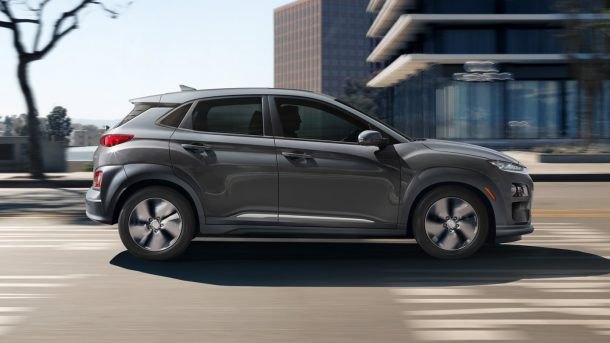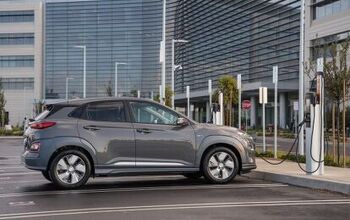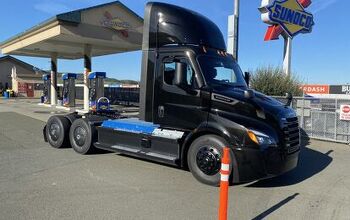Hyundai Ends Kona EV Sales in South Korea
Hyundai Motor Company will end sales of its best-selling electric vehicle, the Kona EV, after a series of fires and faulty braking systems prompted mass recalls in South Korea.
According to Reuters, Hyundai was reviewing the end of Kona EV sales in South Korea, while an unidentified source said sales would continue in Europe. The Kona EV ranks among Europe’s best-selling EVs. Sales of the model outside its home market account for over three-quarters of the total.
Hyundai declined to confirm the reports but told Reuters it is reviewing various options as it prepares to launch the Ioniq 5 mid-size crossover EV. In October, Hyundai recalled Kona EVs in South Korea due to the risk of short circuits possibly caused by faulty manufacturing of its high-voltage battery cells.
On the Hyundai USA website, the Kona is touted as having an EPA-estimated range of 258 miles with zero emissions out of its 150-KW, 201 HP electric motor, hawked as the highest of any all-electric subcompact SUV. Loaded with intuitive tech like wireless device charging and head-up display, what the Kona EV apparently cannot do is put out the fires, nor warn you in advance if the regenerative brakes are going south.
Here in the U.S., you may be eligible for a federal tax credit of up to $7,500, and if you happen to reside in California, you may get a Clean Vehicle rebate of $2,000 if you own a Kona EV.
The recall, which includes software updates and battery replacements after inspections, involves 25,564 Kona EVs built during September 2017 to March 2020. Hyundai has also recalled 50,864 Kona EV and Nexo fuel-cell vehicles in South Korea due to faulty electronic braking systems. Does this mean that Kona EVs will vanish from the U.S., or will the automaker continue selling them until that proposition goes up in smoke?
[Images: Hyundai]
With a father who owned a dealership, I literally grew up in the business. After college, I worked for GM, Nissan and Mazda, writing articles for automotive enthusiast magazines as a side gig. I discovered you could make a living selling ad space at Four Wheeler magazine, before I moved on to selling TV for the National Hot Rod Association. After that, I started Roadhouse, a marketing, advertising and PR firm dedicated to the automotive, outdoor/apparel, and entertainment industries. Through the years, I continued writing, shooting, and editing. It keep things interesting.
More by Jason R. Sakurai
Latest Car Reviews
Read moreLatest Product Reviews
Read moreRecent Comments
- TheMrFreeze The wife unit and I refuse to buy a white/black/grey/silver car...life's too short for boring. As it happens we both drive orange cars right now but slightly different shades. Total coincidence, just happened that the used cars we found that met our requirements (ie: manual trans and at least some amount of character) both happened to be orange. My previous daily driver was orange as well, again total coincidence...they just seem to find us I guess...
- Marcus36 In other words...."WE have no idea what we are doing"
- Donald This is what happens when you make your wife CFO. This is all the result of accounting problems. And could’ve been avoided with a reserve of liquidy.
- Rochester When I was young, a number of girls I dated wanted to own a Jeep. I didn't understand (and don't like them myself), but it was certainly something. So good for Jeep leaning into that.
- 3SpeedAutomatic Elon took his eye off the ball while pre-occupied with "X" (formerly Twitter). Now, Tesla is coming around and biting him on the arse!!In the car business, you need to keep you finger on the pulse. Momentum will only carry you so far. If in doubt, think Lordstown and Fisker. He thinks technology will solve his problems. However, Telsa has moved from premier product to commodity with other manufacturers entering his exclusive domain. Time for Elon to fly back to Tesla HQ and come up with a long term plan. 🚗🚗🚗






































Comments
Join the conversation
Just as an FYI - the Niro uses a different battery. I recently got one and it is a lovely EV.
Attention whomever does the copy editing for this site: please re-read the sentence below. "Hyundai Motor Company will end sales of its best-selling electric vehicle, the Kona EV, after a series of fires and faulty braking systems prompted mass recalls in South Korea." The way that sentence is structured, the company has halted sales on this model altogether after mass recalls in South Korea. Of course, that's not the case - they just halted sales in South Korea. It's a simple mistake, but one that should have been caught before it was published. As it stands, the sentence makes the news story inaccurate. It should be corrected. I'm a longtime reader of this site, and have noticed a drop in basic journalistic quality - press releases being lightly massaged as news stories, news stories with blatant inaccuracies (the "Ford sales are up" one from a couple of weeks ago comes to mind), poor sentence structure causing inaccuracies, and opinion pieces masquerading as news pieces. Here's hoping the editorial staff ups its' game, and soon.